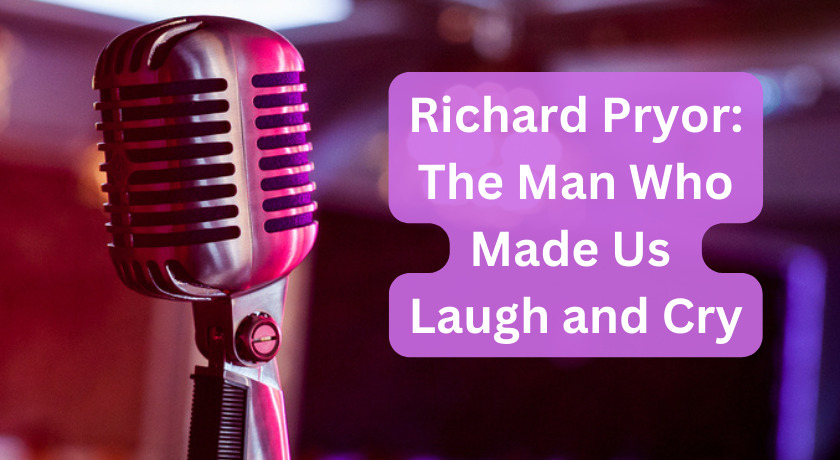Stand-up comedy, as we know it today, is open season for concepts like using profanity, being unique in your styles and delivery, and not only making fun of others, but making fun of yourself. But it wasn’t always like this. At one time, stand-up comedy was just a rant of funny stories and shedding ironic lights on things going on in the world. One of the people who changed the status quo of what stand-up would become, however, was undoubtedly the late legendary comic, Richard Pryor.
Pryor came into the comedy scene in the 1960s, which, as a black comedian, meant you had to rely on properly appropriate stand-up acts about family life in a black home – similar to the style of someone like Bill Cosby. But after performing in Las Vegas for a few years, and realizing he wasn’t being his true self on stage, he decided to take a break and move to Hollywood to discover what his true style was.
He turned to TV and movies in the late 60s and early 70s before returning to the stage with a fire underneath him. He began to revolutionize what stand-up comedy was about, using profanity (notoriously being among the first black comedians to use the n-word in his acts, which got many mixed reviews back then and created many ‘anti-fanbases’ for the late comedian, but would be a fundamental tool for black comedians in the following decade or so), making fun of anyone and everyone, and using his many traumas as something to be laughed at.
For him, and many comedians that followed, joking about the negative things in his life while on stage was almost a way to make light of personal traumas and, in turn, help him get through them.
As a child, Pryor grew up in a brothel in Illinois and was subject to disturbing experiences and racism. Between the actions of his neighbors and even local priests, Pryor experienced more hardship than anyone should ever have to, especially as a child. But he found solace in movies, sneaking off to the local theater and idolizing big-screen actors of the time like John Ford and Howard Hawks.
By 12 years old, he found a passion in acting and being funny, starring in his town’s rendition of “Rumplestilskin”. According to Pryor’s official website, Juliette Whittaker, a supervisor at a public recreational facility in his hometown of Peoria, Illinois casted him for the show and “was so impressed by Richard’s comic ability that she arranged talent shows to showcase him and continued to influence him throughout his career.”
After being expelled from school at 14 and moving from job to job for years after, he enlisted in the US Army at 18, only to be discharged two years later for an altercation with a fellow soldier. During those two years, though, he began performing stand-up. After being discharged, he continued his amateur stand-up pursuit before finding himself on TV and eventually landing a gig in Las Vegas in the mid 1960s, opening for Bobby Darin at the Flamingo Hotel.
He shook the world when he returned in the early 70s as a raunchy, “street” style comic who created his own style and said whatever he wanted about whoever he wanted.
In 2013, Emmy award-winning filmmaker, Marina Zenovich, made the documentary, Richard Pryor: Omit the Logic. She talked to the BBC about how he changed the comedy game.
“When you hear him do those routines they are making it easier for people of different races to talk to each other and laugh with each other. It was groundbreaking.”
She interviewed various comics and actors who had the privilege to see Pryor live on stage, one of which was the late Robin Williams.
“It was like saying you saw Coltrane,” Williams said, referring to the iconic saxophonist, John Coltrane.
In recent years, other comics have spoken about Pryor’s influence on them, including Eddie Murphy and Howie Mandel.
Murphy was a guest on The Tonight Show with Jimmy Fallon a few years ago and talked about how he saw Pryor as a role model.
“He was so nice and sweet to me, and I loved to make him laugh. There was nothing more rewarding than to say something, and have Richard Pryor go [imitates Pryor’s distinct laughing].
“When Richard did that,” he added, “you would be like [Eddie screams in excitement and shock]. To make Richard laugh? Yeah.”
Mandel also talked about how Pryor was virtually the reason he got into stand-up comedy. In an interview with CBS News, he was asked which comics he watched or listened to as a kid.
“I loved comedy,” he started. “The biggest influence that came over me was Richard Pryor. I watched him luckily each and every night at The Comedy Store putting together his “Live On The Sunset Strip” concert movie. I never watched somebody so fearless and so honest on stage. He came every night and worked it. He was great even when it was rough.
“When you think of Howie Mandel,” he added, “you would think of no comparison to Richard Pryor, but that is the template I always use. I’m trying to have that same work ethic on stage and be fearless while trying to create something. In this day in age, it would’ve been interesting to see how he would’ve handled this cultural shift of being politically correct even in the world of comedy.”
Pryor was diagnosed with multiple sclerosis in 1986 and his health rapidly declined throughout the 90s before his death in 2005. In Zenovich’s documentary, she was able to find footage of Pryor being asked how he wanted to be remembered after he died.
“I’d like the people to see my picture and laugh,” he said, “and have stories to tell, tell some lies on me…just to bring joy.”
Sources:
https://www.richardpryor.com/biography.php
https://www.npr.org/templates/story/story.php?storyId=5048430
https://www.bbc.com/news/entertainment-arts-23724276



